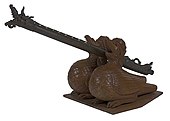| Peurise Awe | |
|---|---|
 A Peurise Awe, circa 1875. | |
| Type | Shield |
| Place of origin | Aceh, Indonesia |
| Service history | |
| Used by | Alas people, Acehnese people, Gayo people |
| Wars | Aceh War (1873–1914) |
| Specifications | |
| Diameter | 35–45 cm (14–18 in) |
Peurise Awe or Peurise Awi is a shield originating from Aceh, Indonesia. The shield was used by Acehnese warriors during the Aceh War against the Dutch colonials in the 19th century. [1]
Description
The Peurise Awe is a peurise (shield) of plaited rattan strips (glong). It may be covered with red or black cotton. [2] The diameter of this shield is approximately 35 to 45 cm (14 to 18 in). The outer part of the shield is strengthened with brass rivets, and inside there is a rope that is used as a handle. The outer part of the shield is decorated with six circular inserts ( bushings) that are made of brass, and one brass star in the middle. The brass decorations are usually in the shape of a hexagram, similar to the Star of David. These hexagonal stars represent 'stars of security'.
References
- ^ Perang Kolonial Belanda Di Aceh. Pusat Dokumentasi dan Informasi Aceh. 1977. ASIN B0000EDU7K.
- ^ Albert G Van Zonneveld (2002). Traditional Weapons of The Indonesian Archipelago. Koninklyk Instituut Voor Taal Land. ISBN 90-5450-004-2.
| Peurise Awe | |
|---|---|
 A Peurise Awe, circa 1875. | |
| Type | Shield |
| Place of origin | Aceh, Indonesia |
| Service history | |
| Used by | Alas people, Acehnese people, Gayo people |
| Wars | Aceh War (1873–1914) |
| Specifications | |
| Diameter | 35–45 cm (14–18 in) |
Peurise Awe or Peurise Awi is a shield originating from Aceh, Indonesia. The shield was used by Acehnese warriors during the Aceh War against the Dutch colonials in the 19th century. [1]
Description
The Peurise Awe is a peurise (shield) of plaited rattan strips (glong). It may be covered with red or black cotton. [2] The diameter of this shield is approximately 35 to 45 cm (14 to 18 in). The outer part of the shield is strengthened with brass rivets, and inside there is a rope that is used as a handle. The outer part of the shield is decorated with six circular inserts ( bushings) that are made of brass, and one brass star in the middle. The brass decorations are usually in the shape of a hexagram, similar to the Star of David. These hexagonal stars represent 'stars of security'.
References
- ^ Perang Kolonial Belanda Di Aceh. Pusat Dokumentasi dan Informasi Aceh. 1977. ASIN B0000EDU7K.
- ^ Albert G Van Zonneveld (2002). Traditional Weapons of The Indonesian Archipelago. Koninklyk Instituut Voor Taal Land. ISBN 90-5450-004-2.


